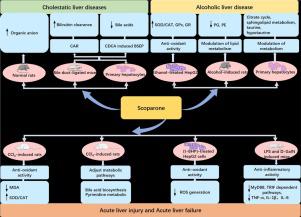Pharmacological Research ( IF 9.1 ) Pub Date : 2020-08-30 , DOI: 10.1016/j.phrs.2020.105170 Yangyang Hui 1 , Xiaoyu Wang 1 , Zihan Yu 1 , Xiaofei Fan 1 , Binxin Cui 2 , Tianming Zhao 1 , Lihong Mao 1 , Hongjuan Feng 3 , Lin Lin 2 , Qingxiang Yu 1 , Jie Zhang 1 , Bangmao Wang 1 , Xin Chen 1 , Xingliang Zhao 1 , Chao Sun 4

|
Scoparone is an active and efficious ingredient of herbal medicine Artemisia capillaris Thunb, which has been used clinically in traditional Chinese medicine formula (e.g. Yin-Chen-Hao decoction) for the treatment of hepatic dysfunction, cholestasis and jaundice for over thousand years. More recently, scoparone has received increasing attention due to its multiple properties. In this comprehensive review, we provide the first summary of the pharmacological effects and pharmacokinetic characteristics of scoparone, and discuss future research prospects. The results implicated that scoparone possesses a wide spectrum of pharmacological activities, including anti-inflammatory, antioxidant, anti-apoptotic, anti-fibrotic and hypolipidemic properties. Pharmacokinetic studies have addressed that isoscopoletin and scopoletin are major primary metabolites of scoparone. Moreover, hepatic dysfunction might promote bioavailability of scoparone due to limited intrinsic clearance. On the other hand, the bioavailability of multi-component including scoparone in certain TCM formula can also be enhanced by applying this formula at a high dose on account of their interacted effects. In view of good pharmacological actions, scoparone is anticipated to be a potential drug candidate for various liver diseases, such as acute liver injury, fulminant hepatitis, alcohol-induced hepatotoxicity, non-alcoholic fatty liver disease and fibrosis. However, further studies are warranted to clarify its molecular mechanisms and targets, elucidate its toxicity, and identify its interplay with other active ingredients of classical TCM formula in clinical settings.
中文翻译:

Scoparone 作为肝病治疗药物:药理学、药代动力学和分子作用机制。
东莨菪酮是中药青蒿中的一种活性有效成分,已在临床上用于中药方剂(如银陈蒿汤)治疗肝功能不全、胆汁淤积、黄疸数千年。最近,scoparone 由于其多种特性而受到越来越多的关注。在这篇综合综述中,我们首先总结了scoparone的药理作用和药代动力学特征,并讨论了未来的研究前景。结果表明,scoparone 具有广泛的药理活性,包括抗炎、抗氧化、抗细胞凋亡、抗纤维化和降血脂特性。药代动力学研究表明,异莨菪碱和东莨菪碱是莨菪酮的主要主要代谢物。此外,由于有限的内在清除率,肝功能障碍可能会促进scoparone的生物利用度。另一方面,考虑到某些中药配方中的多组分(包括东莨菪碱)的相互作用,也可以通过高剂量应用该配方来提高其生物利用度。鉴于其良好的药理作用,东莨菪酮有望成为多种肝脏疾病的潜在候选药物,如急性肝损伤、暴发性肝炎、酒精性肝毒性、非酒精性脂肪肝和纤维化。然而,需要进一步研究以阐明其分子机制和靶点,阐明其毒性,并在临床环境中确定其与经典中药方剂的其他活性成分的相互作用。scoparone 有望成为各种肝脏疾病的潜在候选药物,例如急性肝损伤、暴发性肝炎、酒精性肝毒性、非酒精性脂肪肝和纤维化。然而,需要进一步研究以阐明其分子机制和靶点,阐明其毒性,并在临床环境中确定其与经典中药方剂的其他活性成分的相互作用。scoparone 有望成为各种肝脏疾病的潜在候选药物,例如急性肝损伤、暴发性肝炎、酒精性肝毒性、非酒精性脂肪肝和纤维化。然而,需要进一步研究以阐明其分子机制和靶点,阐明其毒性,并在临床环境中确定其与经典中药方剂的其他活性成分的相互作用。






























 京公网安备 11010802027423号
京公网安备 11010802027423号